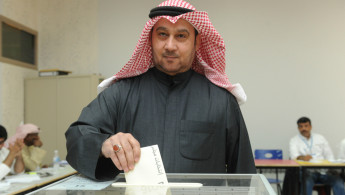Polls open in Kuwait amid feelings of deja-vu
The state-run Kuwait Television reported high turnout, adding that some centres counted 30 percent of voters in a just a few hours of doors opening.
While Kuwait's two previous elections yielded poor turnout due to an opposition boycott, Saturday's election saw the anti-government bloc field some 30 candidates, among a total of 293 hopefuls.
'Hopeful signs'
To some voters, it was an encouraging sign to see more candidates running this time around.
"The [opposition's] return is needed to strike a political balance in the country. They are more capable of monitoring the government actions," retired voter Ibrahim al-Tulaihi said at a polling station south of Kuwait City.
"A wise opposition is needed because we don't want more political disputes," Jarrah Mohammad, a government employee, said after casting his ballot.
But a government crackdown on political dissent has increased in recent years, since protests erupted during the Arab Spring threatening the regime.
This includes the closure of opposition media outlets, the jailing of prominent opposition figures, and changes to the electoral law, which have all undermined some Kuwaitis' confidence that their votes will make much difference.
"There is nothing that drives me to cast my vote," said Nasser al-Dawood, a 26-year old marketer.
"We boycotted the previous elections for a number of reasons. Those reasons are still valid ... our participation will only give legitimacy to this cat-and-mouse game between cabinet and parliament."
Boycott ends
Opposition members boycotted the last polls in December 2012 and now many have either retired from politics or belong to groups that are seen as fractured and ineffectual.
One of the most prominent opposition leaders, Musallam al-Barrack, remains behind bars serving a two-year sentence for a political speech deemed offensive to the emir, Sheikh Sabah al-Ahmad al-Sabah.
Meanwhile, a schism within the ruling al-Sabah family has never been more pronounced, with the government filing lawsuits against a number of ruling family members, including the emir's nephew for allegations of corruption in Kuwait's sports.
 |
Bleak economic backdrop
Saturday's election comes against a backdrop of discontent among Kuwaiti citizens over mounting cutbacks in the cradle-to-grave welfare system they have long enjoyed as a slump in world oil prices hits government revenues.
Oil income, which accounts for 95 percent of government revenues, has nosedived by 60 percent over the past two years, leading to a rise power and water charges as well as hiking petrol prices.
"We want the next parliament to stop the government from hiking prices," said pensioner Maasouma Abdullah.
"We want the government to begin taxing the rich and pay great attention to the low-income sections," added Maha Khorshid, an education ministry employee.
But the emirate has fewer alternatives than its Gulf neighbours, partly because of its elected legislature, according to analysts.
"It has built an economic model completely funded by oil and natural gas revenue to support its workforce, but with its empowered parliament it has less flexibility than any other state in the region to abandon that model," US-based intelligence firm Stratfor said in a recent report.
These concerns, coupled with 87-year-old Sheikh Sabah's advancing age, have raised questions about Kuwait's future.
Still, the economic issues, including a critical shortage of housing for citizens as well as the prospect of further belt-tightening are foremost in voters' minds.
Polls are set to close at 8pm (5pm GMT) with first results expected after midnight (9pm GMT).
Agencies contributed to this report.



